I try to at least sample the major Menghai recipes each year, partly for education, and partly because I find them right tasty.
They're blended for stability, according (as is my limited understanding) to a fairly specific recipe, and using a fairly exacting process. Menghai like to call this the "Dayi process" in their product literature, if that has any meaning.
The handy thing about Menghai making tea according to the same recipe and process each year is that it allows a limited amount of comparison to be made between each years' leaves. As far as controlling the infinitely large scope of the variables each year, testing out the major Menghai recipes is about as close as we're ever likely to get to a fair test.
It's also quite fun not just to compare the major recipes each year, but also to compare the same recipe from different years. Assuming that the content and production is reasonably similar every time, it allows us some interesting insights into how the nature of young tea changes as it ages, and how the various aroma, flavour, texture, and chaqi components evolve over time.
I don't claim to have arrived at any earth-shattering conclusions, but instead mention it as a mere suggestion. As is my constant advice, take everything with a pinch of salt, and find out what all this means to your own palate. Ultimately, I'm just another monkey tapping away on a typewriter, knocking out some notes of my own.
They're blended for stability, according (as is my limited understanding) to a fairly specific recipe, and using a fairly exacting process. Menghai like to call this the "Dayi process" in their product literature, if that has any meaning.
The handy thing about Menghai making tea according to the same recipe and process each year is that it allows a limited amount of comparison to be made between each years' leaves. As far as controlling the infinitely large scope of the variables each year, testing out the major Menghai recipes is about as close as we're ever likely to get to a fair test.
It's also quite fun not just to compare the major recipes each year, but also to compare the same recipe from different years. Assuming that the content and production is reasonably similar every time, it allows us some interesting insights into how the nature of young tea changes as it ages, and how the various aroma, flavour, texture, and chaqi components evolve over time.
I don't claim to have arrived at any earth-shattering conclusions, but instead mention it as a mere suggestion. As is my constant advice, take everything with a pinch of salt, and find out what all this means to your own palate. Ultimately, I'm just another monkey tapping away on a typewriter, knocking out some notes of my own.
I love the price of 7542. Even the "Western price" is nice. Tan recently observed that the Malaysian price is an extraordinarily inexpensive $6 US. Though I bought this for about double that price, I'm happy with it, given my distorted Westernised view of tea prices.
7542 is the butch, ham-fisted, loud-mouthed elder brother of the Menghai family. (I write as a loud-mouthed elder brother myself.) It's aggressive, sharp, and uncompromising when young. It's also one of my favourites. I'm an easy man to please when it comes to pu'er - just give me something with character and I'm well away.
7542 is the butch, ham-fisted, loud-mouthed elder brother of the Menghai family. (I write as a loud-mouthed elder brother myself.) It's aggressive, sharp, and uncompromising when young. It's also one of my favourites. I'm an easy man to please when it comes to pu'er - just give me something with character and I'm well away.
As with every Dayi, it's a small cake. Despite being the regulation 2500g / 7 = 357g, it is small. The compression is tight-ish, but it's not a tiebing [iron-pressed cake]. It is dense. There's some matter in these small little cakes.
Like every young Dayi cake, this one emits a potent aroma of youthful, spicy "green" on opening the wrapper. The product page at Yunnan Sourcing, where I bought these, indicates that this was made from 2006 and 2007 maocha. Perhaps you might be able to make out in the above photograph that the leaves are already a touch darker than one might otherwise expect.
The soup is dazzling yellow. Absolutely nothing has been done to this tea at all, which is quite encouraging, and part of the reason that this cake is traditionally considered "good for aging".
Potency is what the 7542 is all about, and this is obvious even from the wenxiangbei [aroma cup], in which sugary Menghai scents are delivered with all the punch for which this tea is famed. In the mouth, the vibrancy on the tongue and lips is the first sensation to grab the attention, rapidly followed by tons of patented Menghai mushroom-and-straw.
One session with this tea at 5 a.m. resulted in me being wide awake by 5.01 a.m. Marvellous stuff.
Potency is what the 7542 is all about, and this is obvious even from the wenxiangbei [aroma cup], in which sugary Menghai scents are delivered with all the punch for which this tea is famed. In the mouth, the vibrancy on the tongue and lips is the first sensation to grab the attention, rapidly followed by tons of patented Menghai mushroom-and-straw.
One session with this tea at 5 a.m. resulted in me being wide awake by 5.01 a.m. Marvellous stuff.
It rings in the mouth, bitterness piling in at the end to create a significant huigan. Unlike lighter Menghai blends, this has that depth and low flavour that a fanciful imagination could easily extrapolate into becoming the dense, bass flavour beloved of older 7542.
After a few cups, the chaqi is lightly dizzying; after a whole session, I could run a mile - even in English weather.
Though I don't want to wax lyrical about a blend that is a real stalwart each year, a bastion of dependability, I can't help but love this Old Faithful. Every year, it reinvents itself anew in my affections.
2008 was a good year for Menghai.
After a few cups, the chaqi is lightly dizzying; after a whole session, I could run a mile - even in English weather.
Though I don't want to wax lyrical about a blend that is a real stalwart each year, a bastion of dependability, I can't help but love this Old Faithful. Every year, it reinvents itself anew in my affections.
2008 was a good year for Menghai.
Addendum
October, 2013
I have a pile of these ticking away quietly on the shelf, and just noticed that I have not tried them since buying in 2008...
It has darkened during five years, as you might be able to tell from the image below. I have the advantage of clearly remembering this cake as it was in 2008, and so it is heartening to see some changes have occurred.
This is strong tea. I was cautious, leaving some of the leaves in the chahe (char-her, pictured below). This has sweetness, and has a long huigan that I did not expect, after remembering the robust potency of the original.
Some of my cakes taste humid, some taste "dry" - this is more towards the latter. It has the dark, long sweetness of comforting Dayi, but is definitely not "dark Asian tea". Perhaps that should be expected, given its environment.

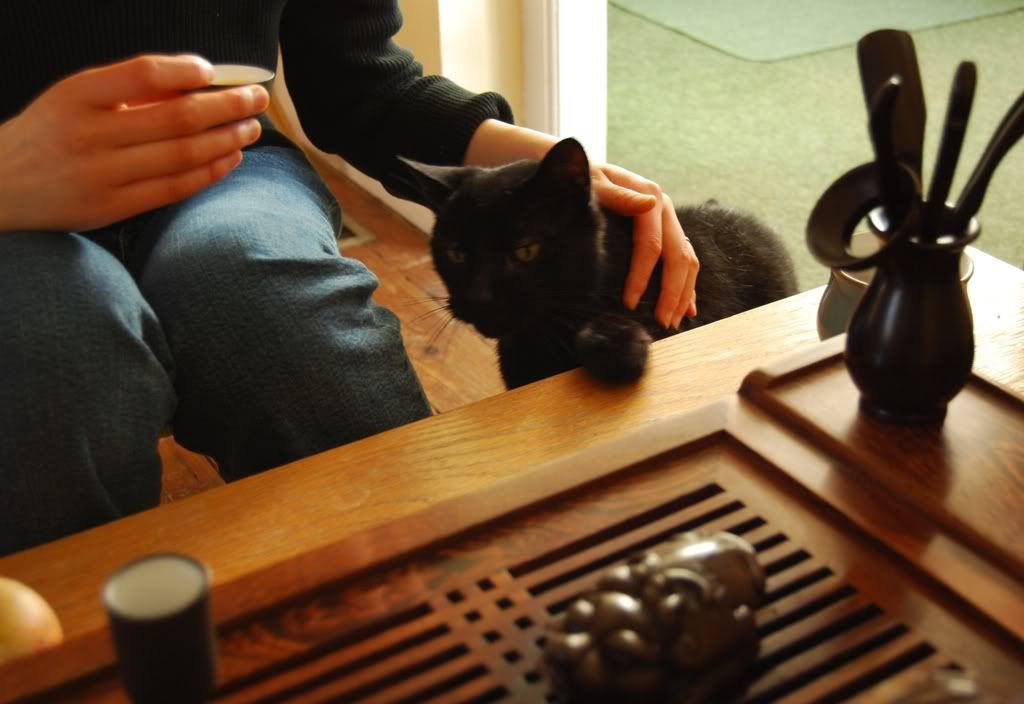
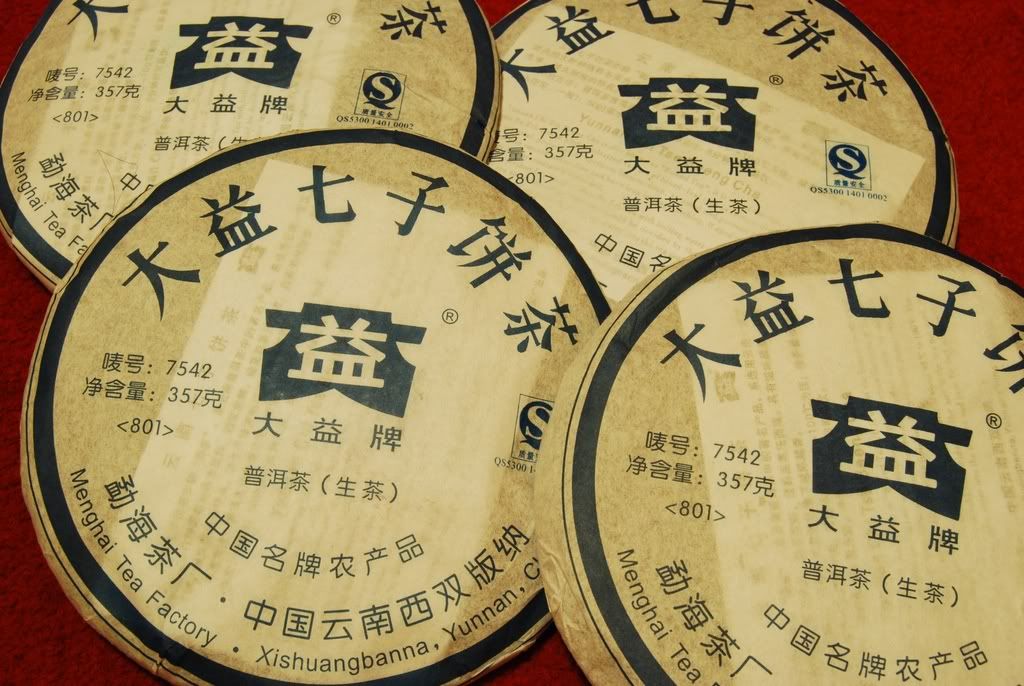
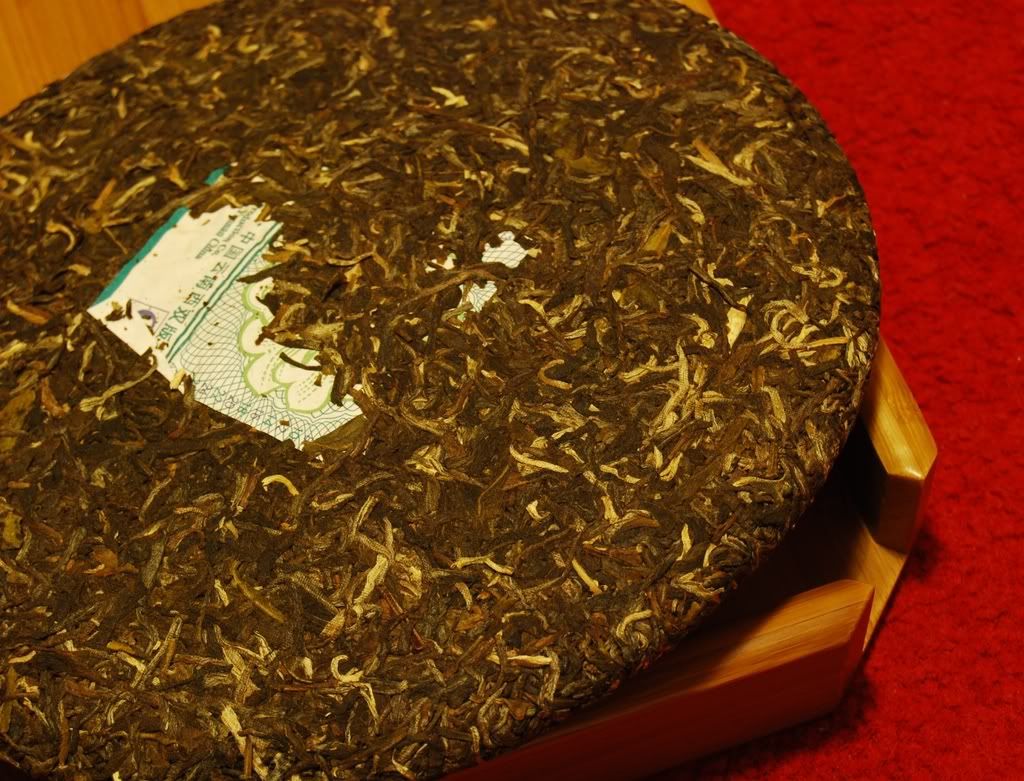
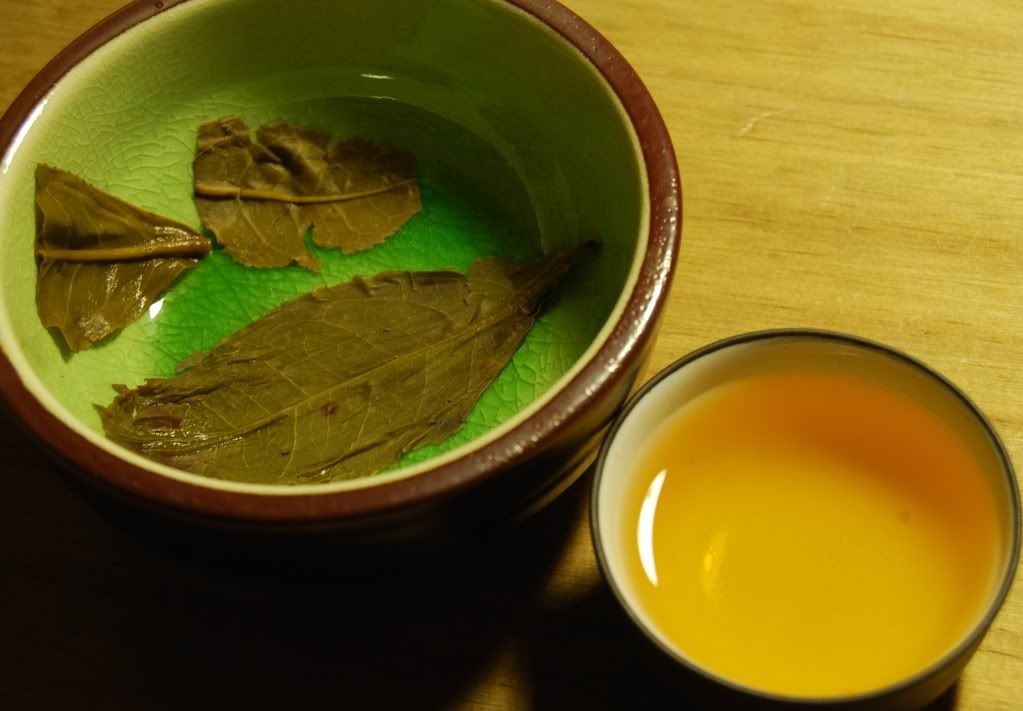
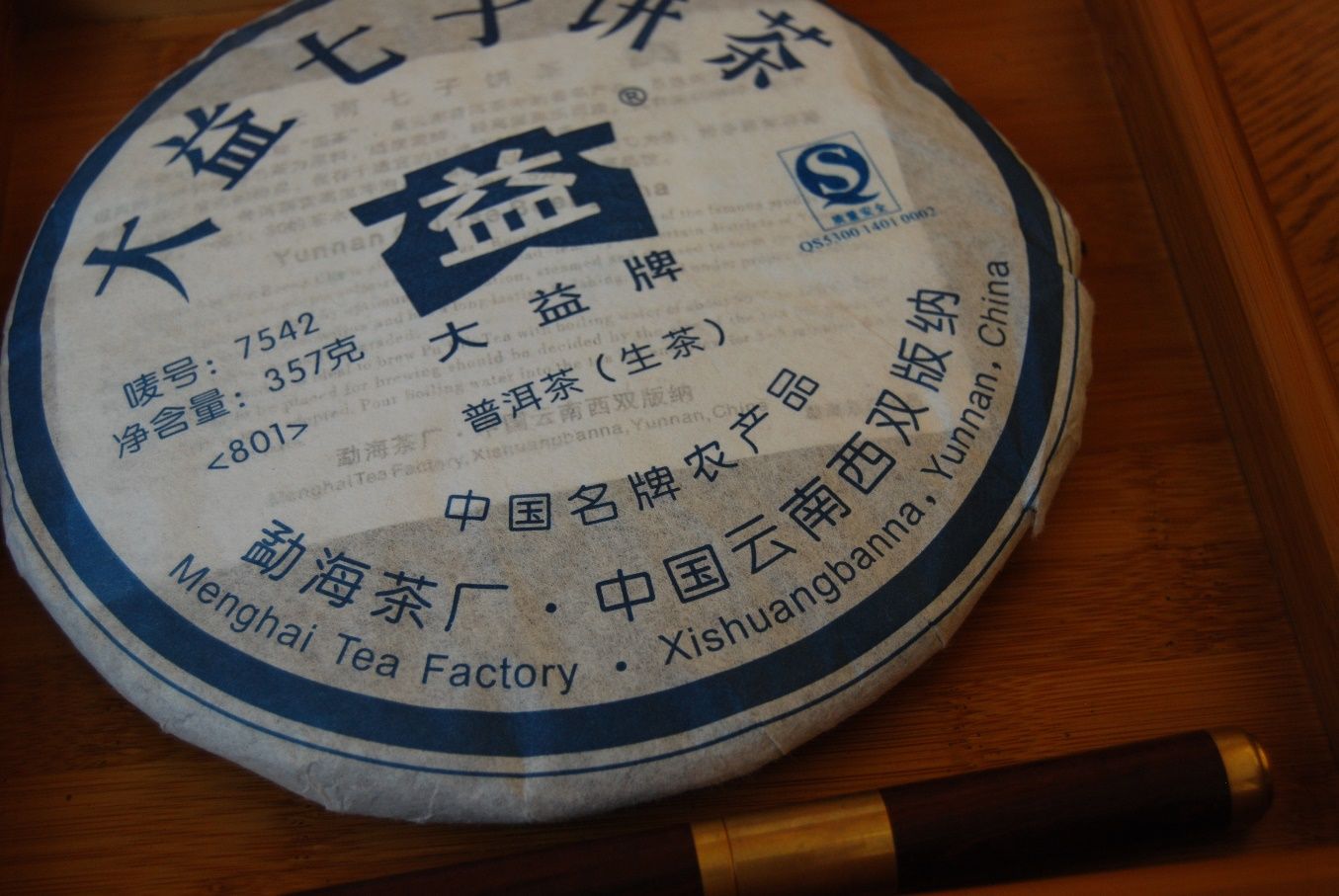
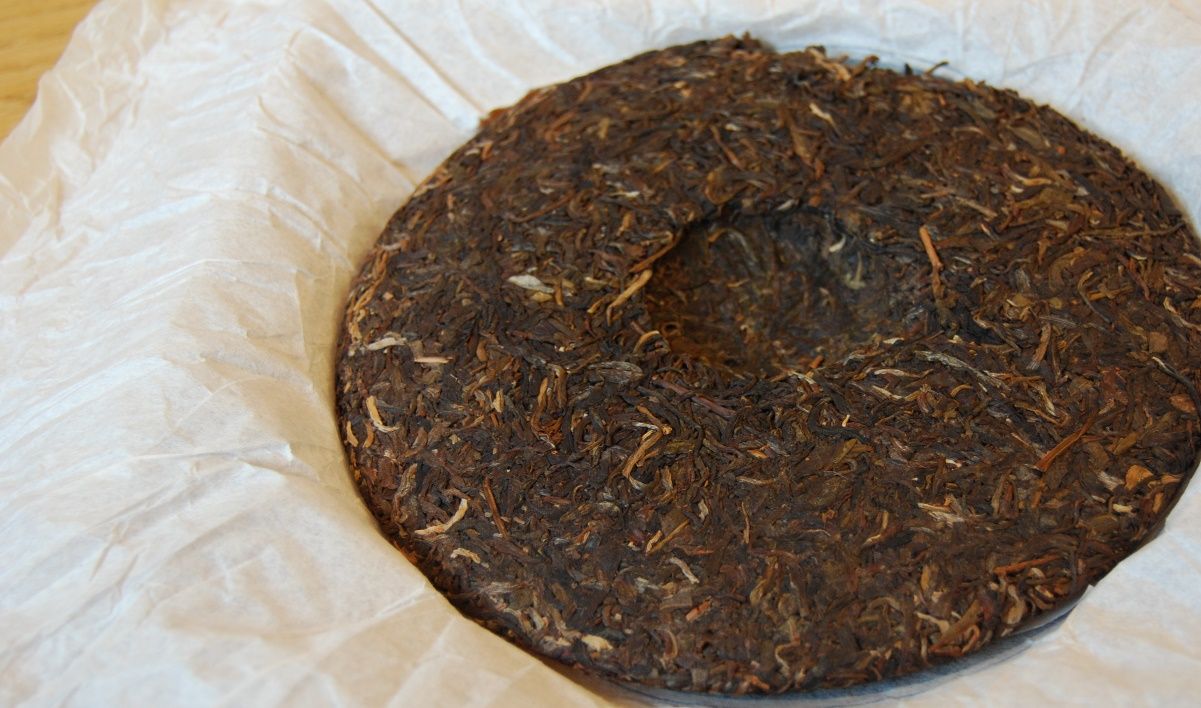
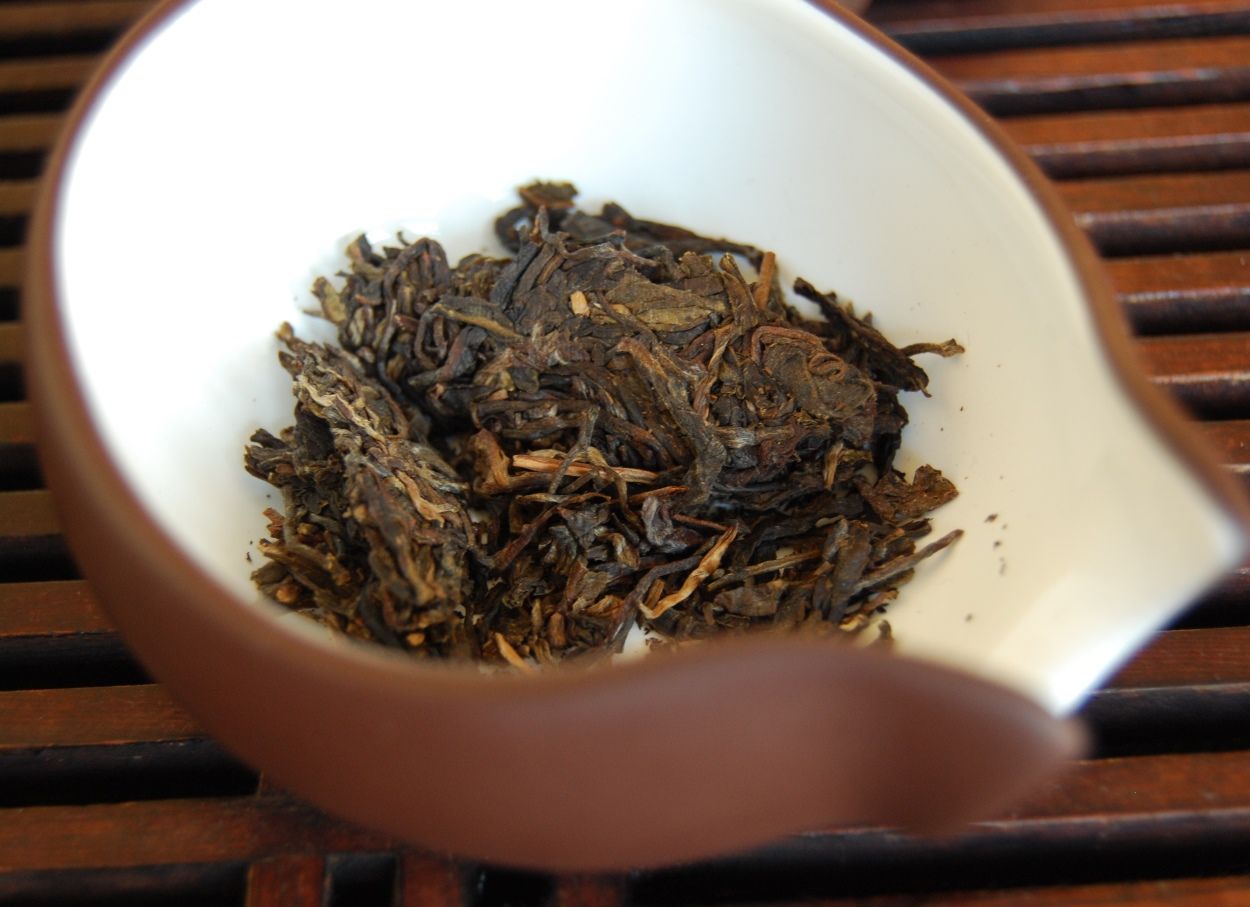
8 comments:
Hi Hobbes,
For me, this is definitely not a "drink now" sheng. Just too many rough edges. Bad tea day for me, may be???
I think I should put my tong of this rough fellers into deep hibernation. Hopefully they will turn up mellower & nicer after 3 to 5 years :)
Ha Ha, not all shops selling puerh that cheap over here. Fortunately I found a reliable "source". If not I have to pay plenty of "tuition fee" for drinking puerh.
Have you tried Dayi 7742 (601)before? I think it is a very good Dayi. If not, I could send you some samples with other puerhs too.
Tan
P.S.: Happy Lunar New Year to your beloved wife.
Dear Tan,
I was about to agree with you, but then I noticed that the tea I'm currently brewing here in my office is, by sheer chance, 7542-801. What are the chances? I found myself unusually awake trying to mark students' work, and realised that it's due to the peculiar potency of raw 7542...
It's all about finding a good vendor or two, yes indeed. Count yourself lucky you have so many dedicated vendors around your home - some of us have to travel to other continents to find a pu'er shop. :)
I've never tried 7742 of any year, actually - how would you describe its character?
I never say no to samples - please let me return the favour. My e-mail address is hobbesoxon@gmail.com :)
Xin nian kuai le! 新年快樂! (For Monday)
Hobbes
NYTimes had article on the bursting of the Pu'erh bubble and it's effects on Yunnan province and Menghai. Any comments or observations?
http://www.nytimes.com/2009/01/17/world/asia/17tea.html?_r=1&scp=1&sq=tea%20yunnan&st=cse
Financial meltdown in New York; puerh meltdown in Yunnan. Same-same but different. GREED.
Hi Hobbes, 7742 (601) is smooth & full. It is my cup of tea :)
Dear Jason,
Thanks for the link! The bursting of any bubble, while traumatic, has its benefits. It washes away the unrealistic, brings us back down to earth, and enables us to focus on what's right and proper. "Never gamble more than you can afford to lose", sayeth conventional wisdom.
Dear Tan,
Smooth and full sounds good to me. :)
Toodlepip,
Hobbes
Hobbes,
Glad you enjoyed this one. It's one of my favourites for sure. I was really impressed by how drinkable it was for being so young. The sweet melon flavour followed by that magic kick did it for me. Initially I bought two bings of this, and after tasting it, scooped up a tong as well. The idea that I'll be able to sample it for many years to come brings me joy to no end.
jamus~
Hi Hobbes,
I'm just awaiting for the same bing Cha to arrive, and I was wondering if one can really enjoy a 2008 Sheng Pu-Erh in the early 2010. Well, you've put a good faith in me ! Have you had a chance to taste some of the Menghai 0712/0732/0752 range pu-erh ?
Thanks,
Helena.
Dear Shoosha,
I suppose that it's down to individual tastes, but I rather like young Dayi cakes! The potent mushroom-and-straw of good old Menghai really does it for me.
7532 is another of my favourites from the Dayi classics, but I've not had the others that you mention. I hope that your Dayi turn out well - keep us posted!
Toodlepip,
Hobbes
Post a Comment